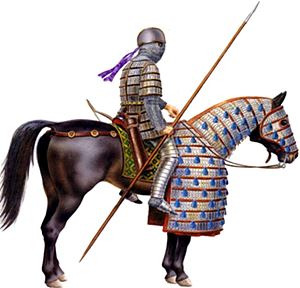
Battle of Solachon(Battle of Arzamon) |
year: 586spring 586 |
| A Byzantine victory against Persians | ★ ★ ★ ★ ★ |
|
enemy: Sassanid Persians
|
location: Plain of Solachon, south of the fortresses of Mardes (modern Mardin) and Daras, in Mesopotamia. The location is at the Syrian borders with Turkey
|
accuracy:
●●●●●
|
|
battle type: Pitched Battle |
war: Byzantine-Persian Wars |
modern country:
Syria |
| ▼ The Byzantines(emperor: Maurice (Mauricius)) | ▼ The Enemies | |
| Commander: | General Philippicus | General Kardarigan |
| Forces: | less than 10,000 and outnumbered, cavalry only | less than 10,000, cavalry only |
| Losses: |
| Background story: |
| The Roman–Persian War of 572–591 had been going on inconclusively for several years, with both sides roughly evenly balanced, and periods of truce and negotiations succeeding periods of active warfare. In 586, hostilities resumed, and Philippicus, brother-in-law of Emperor Maurice, moved to intercept the anticipated Persian invasion. He strategically located his army at Solachon, controlling the various routes of the Mesopotamian plain, and especially access to the main local watering source, the Arzamon river. Persian general Kardarigan advanced against him and met the Byzantine force already deployed in battle order. |
The Battle: |
 Persian horseman Philippicus ordered the men of the central division to dismount and form a shield-wall with their lances projecting from it (the fulcum tactic). This broke the momentum of the Persian counter-attack. the Byzantine left managed to launch a successful counter-thrust which drove back the opposing Persian right in disarray. Soon, the Persian right broke and fled, pursued by the Byzantines. With both wings having disintegrated, the Persian center was now subject to an attack from the reformed Byzantine right, which drove them towards the area once occupied by the Persian right. Outnumbered and attacked from several sides, the Persians soon began to break and flee. |
Noteworthy: |
| The defeated army suffered greatly, not only from the Byzantine pursuit, but also from lack of water: before the battle, Kardarigan had ordered the water supplies shed to the ground, to create a win or die attitude. |
Aftermath: |
| The victory allowed the Byzantines to regain the upper hand, and in its aftermath they began to re-establish their control over the region around Dara. But it was not a decisive victory. |
|
|
